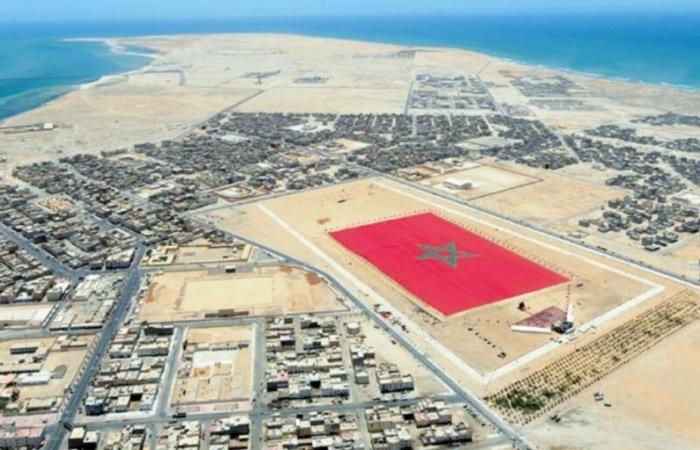Since the Green March of 1975, Morocco has been able to rally unprecedented international support for its autonomy plan for the Sahara. Nearly 100 countries, including world powers, have recognized Moroccan sovereignty, marking a decisive turning point in the resolution of this regional dispute.
On November 6, 1975, Morocco made history with the Green March, a peaceful initiative which made it possible to complete the territorial integrity of the Kingdom with the recovery of its Sahara. The Green March, which mobilized 350,000 volunteers, remained a cornerstone of Moroccan unity, with the Kingdom’s constant involvement in the development of the southern provinces.
Today, modern infrastructure, a dynamic economic model and active political participation illustrate the level of development achieved in this region, reflecting the unwavering attachment of the inhabitants of the southern provinces to the Moroccan nation. Nearly fifty years later, this historic commitment is consolidated by significant political and diplomatic progress, illustrated by the opening of numerous African and international consulates in Laâyoune and Dakhla, as well as by the support of great powers.
The recognition of Moroccan sovereignty over the southern provinces by the United States in 2020, under the administration of Donald Trump, constituted a major turning point, prompting other nations to openly support the autonomy plan proposed by the Kingdom .
Diplomatic successes in Africa and beyond
Morocco has mobilized a powerful diplomatic network in Africa, obtaining the support of a large number of countries on the continent, as highlighted by Moroccan MP Leila Dahi during an intervention at the United Nations. This African recognition is illustrated by the opening of consulates in the southern provinces, symbolizing regional and continental acceptance of the Moroccan nature of the Sahara.
“The continuation of the opening of consulates general of friendly and brotherly countries in Laâyoune and Dakhla is the fruit of the wise African policy of King Mohammed VI,” declared Nasser Bourita, Minister of Foreign Affairs, during the inauguration in Laâyoune of the consulates general of Zambia and Eswatini, in 2020.
This royal policy in Africa has always focused on initiative, solidarity and the obligation to move from words to action, in addition to the establishment of “fruitful partnerships which benefit everyone”, he underlined.
The Trump effect and shift of Europe
Unexpected and emblematic, Donald Trump’s recognition of the Moroccan nature of the Sahara had immediate repercussions, inspiring other powers to review their position on the issue. Two weeks later, on December 24, then-US Secretary of State Mike Pompeo announced the establishment of “a virtual presence station”, an important first step in the process of creating a new American diplomatic mission.
A few months later, David T. Fischer, United States Ambassador to Morocco, made a historic visit to Dakhla to launch the process of opening an American consulate in the southern provinces. A first in diplomatic relations between the two countries. This diplomatic initiative took on even more importance as Ambassador Fischer was accompanied by David Schenker, Assistant Secretary of State for Near Eastern Affairs. Schenker’s presence and discussions reinforce the message sent to the world that the United States is ready to invest in the stability and prosperity of this strategic region.
The historic decision of the Trump administration to recognize Moroccan sovereignty over the Sahara has undeniably redefined the dynamics of the Saharan issue on a global scale. In March 2022, after several months of diplomatic tensions, Spain, through the voice of Pedro Sánchez, its Prime Minister, expressed its support for the Moroccan autonomy plan, qualifying this initiative as “the most serious, realistic and credible basis for the resolution of the dispute.
This historic decision by Spain, Morocco’s main economic partner in Europe, demonstrated the influence of the American position on the strategic choices of the countries of the Old Continent. On August 20, 2022, in his speech delivered on the occasion of the Revolution of the King and the People, King Mohammed VI clarified, without the slightest equivocation, the importance of the Sahara question for Morocco, affirming that “ the Sahara issue is the prism through which Morocco considers its international environment, and the yardstick which measures the sincerity of friendships and the effectiveness of the partnerships that the Kingdom establishes.
Through this affirmation, the sovereign established that the Sahara question constitutes a fundamental criterion for evaluating the diplomatic relations of the Kingdom, specifying that Morocco’s long-term alliances are now based on the recognition and respect of its sovereignty over this territory.
French support long awaited
The latest is the formal recognition by France of Moroccan sovereignty over the Sahara. Long awaited, the announcement by French President Emmanuel Macron, the wording of which was unambiguous, truly marked an important diplomatic step forward.
In his letter to King Mohammed VI, dated July, Macron affirmed that “the present and future of Western Sahara are part of the framework of Moroccan sovereignty”, a sentence which aligns France with the position adopted by the United States in 2020.
The French president will then be received with great fanfare in Rabat by King Mohammed VI, delivering a historic speech to Parliament on this occasion, and reaffirming Morocco’s sovereignty over its Sahara.
This visit ultimately made it possible to consolidate bilateral ties. In this context, Emmanuel Macron proposed strengthening the strategic framework linking the two countries to mark, in 2025, the 70th anniversary of the Kingdom’s independence. This announcement is accompanied by economic and diplomatic commitments, aimed at turning the page on recent disputes and redefining Franco-Moroccan partnerships to respond to common challenges.
Emmanuel Macron
President of the French Republic
“For France, the present and future of the Sahara fall within the framework of Moroccan sovereignty.
Donald Trump
45th President of the United States
“Morocco recognized the United States in 1777. It is therefore appropriate to recognize its sovereignty over Western Sahara.”
Pedro Sanchez
Head of the Spanish government
“Spain recognizes the importance of the Sahara question for Morocco and considers the Moroccan autonomy initiative, presented in 2007, as the most serious, realistic and credible basis for the resolution of the dispute.”
Faiza Rhoul / ECO Inspirations






